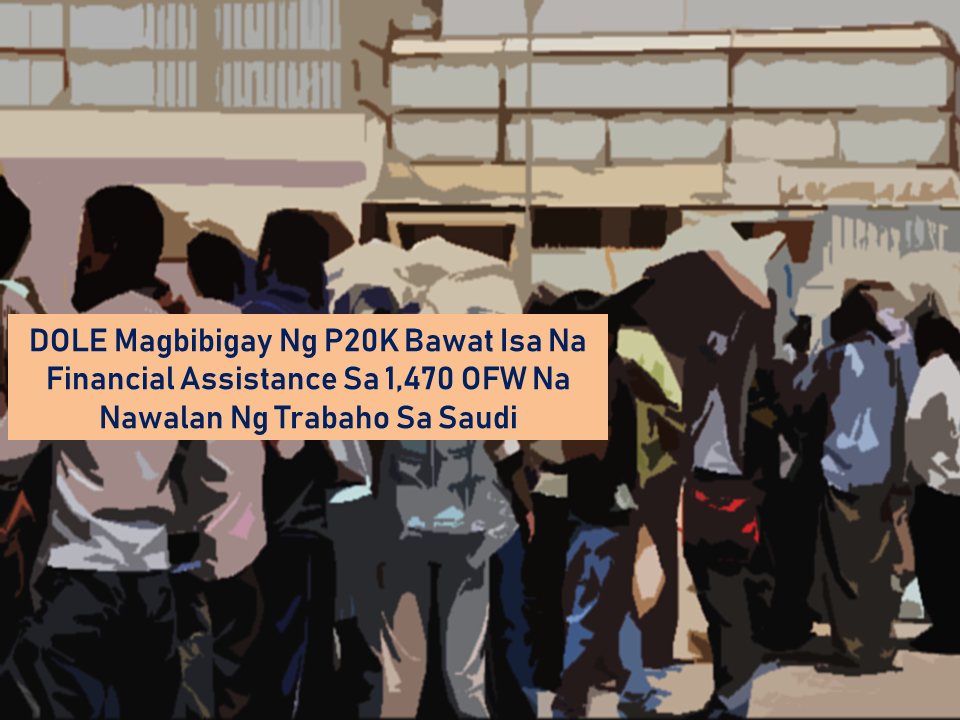Before you decide to apply for a household work in Saudi Arabia or any part of the Middle East, there are many things that you should consider. We can read cases of abuse and maltreatment almost every day mostly from the Gulf area. Videos of overseas Filipino workers (OFW) deployed as household service workers asking for help are everywhere in social media. Working abroad takes a lot of sacrifices and if you are not prepared, you better back-off and re-assess yourself.
Ads
Sponsored Links
If you decide to work as a household worker abroad especially in the Middle Eastern countries particularly in Saudi Arabia or Kuwait, you must be prepared for the worse things that could possibly happen to you.
1. Be prepared to work even if you are sick.
A Filipina domestic worker in Saudi Arabia was barely 3 months after being deployed in a Saudi household when she felt ill but she said the employer still wanted her to work. When she said she cannot work due to sickness, her sponsor took her out and told her that they will bring her to the hospital for a check-up. To the surprise of the OFW, they went straight to the airport and the employer sent her home with nothing with her.
1. Be prepared to work even if you are sick.
A Filipina domestic worker in Saudi Arabia was barely 3 months after being deployed in a Saudi household when she felt ill but she said the employer still wanted her to work. When she said she cannot work due to sickness, her sponsor took her out and told her that they will bring her to the hospital for a check-up. To the surprise of the OFW, they went straight to the airport and the employer sent her home with nothing with her.
2. Be prepared to live a life of a slave.
Yes. Modern-day slavery still happens even at this age.Saudi sponsors spend a lot just to get a household help from abroad and they want their every pennies worth. That explains why they want you to do whatever they ask you to do.
3. Get ready to leave all the feeling of being comfortable in your home country.
Aside from a different climate, get used to the feeling of not eating on time, not getting enough sleep, being locked up inside the house or being dragged around by your sponsor and asking you to clean other houses outside.
4. Prepare and guard yourself against abuse and maltreatment.
An OFW from Lebanon narrated her ordeal with her employer that tried to sexually abuse her. Luckily she managed to escape after staying and sleeping in the toilet just to prevent her employer from getting to her. She was able to escape the life in her sponsor which she described as "hellish".
5. Get ready to experience the worse physical pain you could ever imagine.
Imagine being scalded with oil or boiling water or being whacked by a frying pan in the head. These physical abuses are not only happening in telenovelas you used to watch in the Philippines but in real life and with you.
6. Should you want to escape from your sponsor due to severe abuse, please do not put yourself in danger.
Your family is counting on you and they are also worried about you. Do not endanger your life by jumping off a building. Social media can help you.
7. Rape and sexual abuse happen and you need to keep yourself safe.
Filipinas in general always observe cleanliness and personal hygiene and they do it everywhere they go. In a country where there is a strict dress code among women, where they must be covered from head to foot, sometimes, other Filipinas forget that they are not in their own home. Taking a bath and going out afterward with only a towel covering their body, it could trigger the manly nature of some employers. To avoid being a victim of such abuse, you must observe modesty and dress up accordingly.
If the sponsor keeps on sexually harassing you, what the OFW did on the video could help you get an idea on how to deal with it. If the harassment is so serious and frequent, lock yourself up in a room and find help by contacting someone that could extend help immediately.
8. Many OFW suffers broken family relationships due to distance and inadequate communication.
Sadly whether the OFW admit it or not, working abroad has its consequences especially in family relationships. It could be between couples or between parents and kids.
Sometimes, poor communication can cause the other half to cheat.
It could ruin relationships and could break a once used to be a happy family.
9. Not all that your agency told you and what you read in the contract they make you sign in the Philippines is going to happen in its entirety.
Upon arrival to your country of deployment, the employer has a different set of contract for you to sign which is far different from you signed in the Philippines. they will tell you that they will send you bank if you will not sign. Like being trapped miles away from home the poor OFWs agree to the new conditions.
10. Remember that by working abroad you are risking your life, your family relationship, and the safety of your children.
Studies show that the children of OFWs are most prone to abuse, both physical and sexual. The worse of it, your children might suffer abuse in the hands of those who are living with them under one roof.
Yes. Every parent wants the best future for their kids. With the present status of our country, it may appear as impossible to give it to them. In a country where the unemployment rate rises, prices of commodities and services increase while the salary remains less, going abroad for work may appear to be a solution but we also need to weigh the circumstances. Working abroad may benefit the family one way or another but it can possibly ruin everything if we are not careful enough.
Filed under the category of Tips, OFW, Saudi Arabia, Middle East, abuse, maltreatment, overseas Filipino workers, OFW, Gulf, Working abroad
Ads
Read More:
©2018 THOUGHTSKOTO








